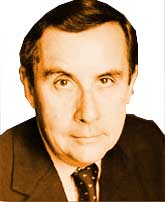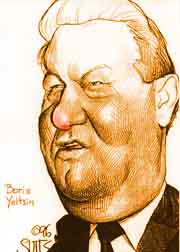|
|
William Pfaff
 Signs of hope in troubled Russia
Signs of hope in troubled Russia
MOSCOW -- Before the latest of Boris Yeltsin's political coups, the dismissal on Monday of his entire government, Moscow struck one as a city where peace and quiet is now wanted by those in a position to enforce it.
 The men who own the new Russia, having divided up the
state's resources in the guise of westernizing reform, prefer
stability in which to consolidate and enlarge their gains, while
moving their profits elsewhere.
The men who own the new Russia, having divided up the
state's resources in the guise of westernizing reform, prefer
stability in which to consolidate and enlarge their gains, while
moving their profits elsewhere.
Politics concerns what they want, rather more than what anyone else wants, including the unruly deputies in the Duma. Yet it seems reasonable to say that stability suits the public too, at least the public in Moscow.
A brief visit affords only superficial judgments, but I have been struck this time by the repaired and cleaned buildings and orderly streets, where there are fewer beggars and homeless in the central city than in Washington, D.C.
That is not automatically a positive sign, since the Russian homeless, unlike the American, cannot count on the right to display their misery where they please. However at Moscow University, where I gave three talks to journalism students, the handsome old building is dilapidated and repairs and paint are needed, but the students are better dressed and better groomed than at the more politically correct American universities, and they are intellectually alive, articulate, interested, and interesting.
Moscow, I know, is unrepresentative of the rest of Russia, and salaries are not being paid on time to millions of people, who together with those who have no jobs at all have to scrounge desperately to survive. Industries and infrastructure are still collapsing, The famous long-suffering patience of the Russians is again being tested in what, in some regions, would in some other countries be pre-revolutionary conditions.
On past visits I have left Moscow relieved to be getting out and depressed about the state of the country. I did not feel that this time. The plutocracy now seems firmly established, and even if the plutocrats are unsavory, theirs is a form of government which has worked and endured in the past.
Thus the general assumption here that Mr. Yeltsin's dismissal of his cabinet doesn't mean much politically, and could even improve matters economically. The president has already said that some of the dismissed will be welcomed back, and that his economic policy -- "reform policy" -- is to be accelerated by the new team, when it arrives.
The new acting prime minister, Sergei Kiriyenko, is charged with paying wage arrears and dealing with the consequences of the drop in world oil prices. The former is crucial for the apparatus of state and the state-owned industries, and to maintain the present government's support. The latter is of considerable consequence to the Russian energy industry, which is an important force in the country's new ownership.
The "New Russian" plutocracy is not a creative one, in that its members exploit what they have taken from the state, rather than creating new wealth, which is what those who believe in the romance of capitalism think that plutocrats are supposed to do. But the possibility exists for good things to grow up from below.
There are also would-be presidential candidates who are outside the existing system, the most intriguing of them General Alexander Lebed, who continues to say unexpectedly intelligent things, and who would like to become the Russian de Gaulle.
In any case the Russians themselves are chiefly responsible for the system they now have. As Peter Rutland and Natasha Kogan write, in a summary of the corruption problem published in the important Prague-based magazine, Transitions, "both the shock therapy and voucher privatization programs ... which got Russia into this capitalist mess (but out of the communist mess) were forged in-country and deviated from the 'Washington consensus' on how the economic transition should be managed."
In the absence of a legal and judiciary system adequate to deal with what has happened, and in the social conditions thus produced, a pervasive nihilism is also evident in Moscow, in contrast to the positive forces which exist. It is reinforced by the existence of a large and usually exploitative foreign trading and business community, whose members are mostly out to get their piece of "New Russian" wealth before it's all gone.
An expatriates' guide offers star-ratings of nightclubs and restaurants on the quality of the prostitutes available and for what it calls the flathead factor -- meaning "will you walk out alive?" (The reference is to the incidence of crew-cut, armed, and pharmaceutically impaired young gangsters/bodyguards likely to be encountered.) One star means "probably." Three stars is not so good.
Russia itself will survive all this, but whether a decade hence it
will have walked out of its present condition in good health is
the unanswerable question. The flathead rating for the nation
is probably between one and two stars, "probably," but
3/25/98: National Front amassing power
3/23/98: NATO's expansion contradicts other American policies
3/18/98: The New Yorker sought money, but lost it
3/16/98: America's 'strategy of tension' in Italy
3/13/98: Slobodan Milosevic may have started something that can't be stopped